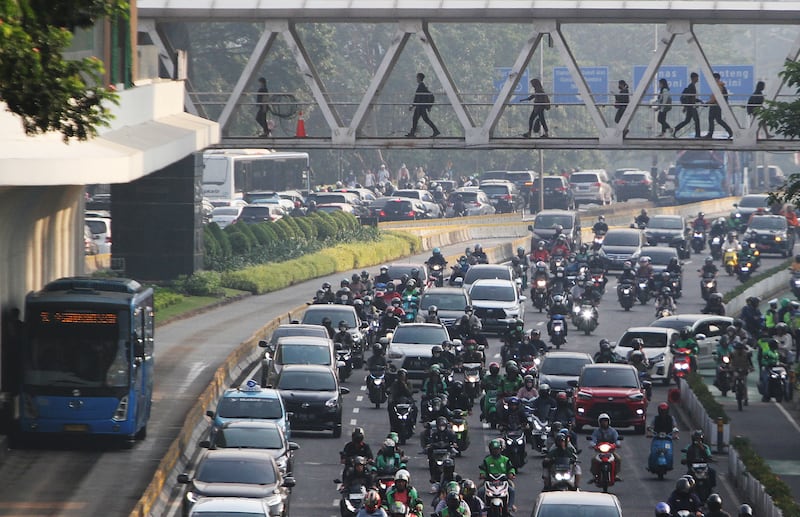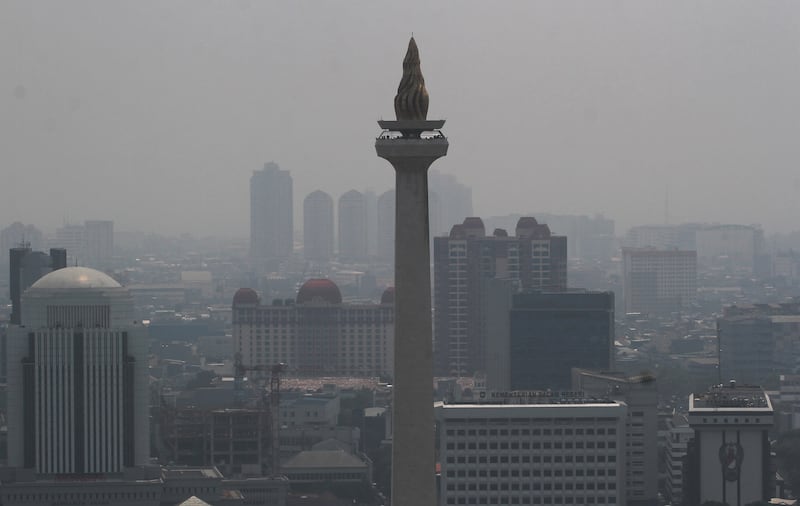UPDATED at 12:28 p.m. EDT on 2023-08-10
Air pollution in Jakarta climbed to levels about 16 times higher than what the World Health Organization considers safe on Thursday, turning the sky a toxic gray and placing it in the ranks of the world’s most polluted cities for dirty air.
The Indonesian capital, which is home to more than 10 million people, has been smothered in "unhealthy" levels of air pollution for several days, according to Swiss air quality technology company IQAir data.
On Thursday morning, IQAir data showed that Jakarta at the time was the most polluted major city globally for dirty air. Concentrations of the tiny particulate matter PM2.5 – the most harmful air pollutant – reached 81.5 micrograms per cubic meter by 11 a.m. local time, it said.
Current WHO guidelines state that annual average levels of PM2.5 should not exceed 5 micrograms per cubic meter, while 24-hour exposure should not exceed 15 micrograms per cubic meter.
Indonesia’s Ministry of Health has urged citizens to wear masks while doing outdoor activities.
Health Minister Budi Sadikin raised concerns the pollution could increase the incidence of asthma attacks and provoke other respiratory diseases.
“There are several respiratory diseases with a high prevalence that are caused by air pollution,” he said in a Thursday statement.
Air pollution is not a new problem for Jakarta, which suffers from chronic traffic jams and industrial smoke from factories surrounding it. IQAir ranked it the most polluted city in Southeast Asia last year and the 26th worst globally.
For many residents, dealing with the toxic air quality has become a daily struggle.
Andi Asrun said the air pollution had become so bad he was changing how he traveled to work each day from the outskirts of the city.

“I’m changing from using a motorbike to taking the train or bus, because I cannot manage anymore pollution,” he told BenarNews.
Astrid Anya, a 27-year-old employee at a private firm in Jakarta, said, “even though masks are no longer mandatory, I prefer to wear them when doing activities in Jakarta because the pollution is so bad.”
Emissions from motorized vehicles account for most of Jakarta’s pollution, according to Nirwono Yoga, an environmental analyst from Trisakti University. Only about 10% of city residents use public transportation.
“So, the transportation sector must really be addressed,” Nirwono told BenarNews, adding that many private vehicles on the roads would not pass emissions tests.
Nirwono said 21 million motorbikes and 4 million cars enter Jakarta each day.
Muhammad Aminullah, a Jakarta-based campaigner from the environmental organization WALHI, said authorities failed to learn from past experience.
“It could be that the government really doesn’t care, that’s why this condition never changes,” Aminullah told BenarNews.

Fed up with government inaction, some Jakarta residents have taken the matter of air pollution into their own hands.
In 2021, an Indonesian court found President Joko "Jokowi" Widodo and other senior government officials negligent of ensuring clean air for residents of Jakarta.
The judges ruled in favor of citizens and activists who filed a civil lawsuit in 2019 and ordered seven co-defendants to take strict action to reduce air pollution in Jakarta.
This report has been updated to clarify information in the headline.
